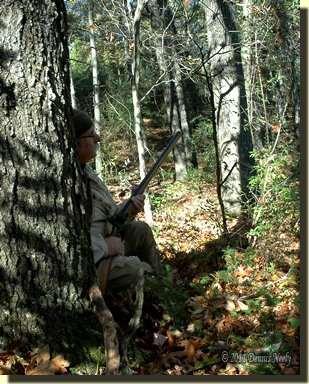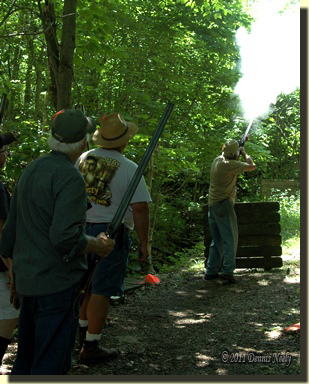Two wood ducks whistled, but remained unseen. The hired hunter crouched down as he tucked the bag of duck shot into the deerskin shot pouch that hung on his right side. Light rain drizzled through a humid fog. The air smelled of earthworms and wet oak leaves. The fowls, a hen and a drake, edged the hardwoods, winging just inside the narrow clearing. With a sharp bank right, the drake looked down on the standing water in the south corner of the huckleberry swamp. The pair veered into the oaks and hickories with another shrill whistle.
The woodsman grounded his right knee out of habit. The Northwest gun eased up. With judicious care, an anxious thumb clicked the cock into the sear’s first notch. Teeth gripped the horn’s plug. The index finger covered the cow horn’s tip, cut off and augured out, metering a dash of black granules into the pan. Plug in place, the frizzen snapped closed, ready for the wood duck’s second pass, which never materialized.
Ten minutes ticked by. The forest tenant scrambled to his feet, sighed and tipped the smoothbore’s muzzle down as he pressed the stock and lock under his right arm. The death bees rattled and buzzed, then pitter-patted onto the wet leaves.
The fowl’s whistle interrupted the backcountry hunter; he did not roll and tamp the final leaf over the precious charge. He knelt again. More out of superstition than frugality, his fingers gathered up all the black pebbles his eyes could see, not wishing to miss “the golden orb,” the solitary bee that might down his next meal.

The hired hunter resumed the evening’s still-hunt. Buffalo-hide moccasins whispered down the rise, along the doe trail to a stout oak tree that grew up and out over the thickets stagnant water. His rolled blanket, bound with a leather portage collar, thumped behind the oak. He glanced about, then sat on the wool cushion, hoping the wood ducks might return to roost in the sequestered puddle.
Ferns and sumac dotted the point to his left, to his right more oaks, a single shag-bark hickory and two wild cherry trees. The oaks still flaunted an abundance of green leaves; the hickory was golden yellow and the cherries almost barren.
A long-legged spider crept up the right, hunt-stained leggin, but paused at the leather thong, the one that replaced the tie the woodsman lost the week before on a wild turkey hunt, two ridges west of the huckleberry swamp’s wet corner. As he watched the spider, the hunter realized the rain stopped. A fox squirrel barked, “Chukk, chukk, chukk, chukk.”
Geese ke-honked to the west, seeking a night’s rest on the River Raisin, sounding like they dropped in at the sand flats. Two more flocks arrived. A red squirrel twittered, “Churrrrrrrrrrrrrrrrrr, churrrrrrrrrrrrrrrr.” Five chickadees whirred in. “Chic, a-dee, dee, dee, dee…” they said as they flitted from twig to twig. And then the silence descended that marked the end of that dismal, but joyous November day, in the Year of our Lord, 1795…
Unraveling a Mystery
Ten or so years ago, a traditional black powder hunter sent me an email, wanting to set up a time to talk. He had a problem with a wild turkey hunt. The tale of woe began at the end. The gobbler took his time strutting to the hen. The time traveler was anxious, breathing hard and shaking a bit, but he calmed his nerves when the tom stepped inside the crossed sticks that marked the fusil’s maximum effective distance.
“I gave him a couple of steps,” he said. “He stopped in front of a dead oak with no bark. I was right on. The pan flashed. The gun fired quick. Above the smoke, I watched him fly up in a distant tree top. I waited, then he flew off.” He paced the distance at twenty-one yards.
The conversation reverted to the beginning of the hunt. Well before daylight, the voyageur, his family was French Canadian so his persona reflected a great, great, great relative’s 18th-century profession, left his house, walked to the back of his yard and loaded the fusil de chasse. A fresh load for each day was his habit. He followed the foot trail into the woods and set out one hen decoy. He took his place in a makeshift blind of twigs, limbs and burlap. “It’s almost impossible to see me,” he added.
We talked more. I asked the same questions as before, but with a different slant. I had nary a clue. He mentioned that he was running late, because he’d overslept. “The birds started gobbling while I loaded.” I went on with the friendly interrogation all the way to him sitting in the blind. There was no plausible explanation for the miss, which frustrated me. I wanted to offer an answer, maybe two, other than “buck fever.”
Meshach Browning, one of my hunter heroes, fessed up to a bad case that occurred during a deer hunting challenge. The “shakes” cost him a jug of whiskey and earned a hearty ribbing:
“…Presently a very large buck made his appearance, when I said to myself: ‘That will make the sixth deer, beside two gallons of whiskey, and the reputation of being the best hunter in the woods.’
“…The buck gradually drew nearer, but the pine-trees stood so close together, that it was a hard matter to secure a good aim, and besides, I found I was becoming so much excited that my hand was growing unsteady…I waited to get rid of the shakes, though to no purpose…I put my gun against a tree, thinking thus to brace myself…I fired at his whole hips, at a distance of not more than twenty steps, without ever touching either hide or hair of him…” (Browning, 172)
As I thought through the circumstance, step by step, I remembered the wood ducks. “Did you hear your shot hit the dead oak?” There was a long silence; careful recollection sometimes takes a few minutes.
“I’m sorry, I don’t remember,” was his response, “why?”
“Just a hunch,” I said, followed by an explanation of my mistake. But he was certain he seated an over-the-shot card on a hefty charge of #4s. We talked through the possibilities, settling on lost shot or buck fever as the most plausible.
He called back the next evening. “I checked the oak this morning,” he said with a humble tone. “Not a pellet in that tree.” He went on to say that he always loaded in the same spot, because he liked to lean his ramrod against the maple at the edge of his woods. He checked there on the walk home. “I found the shot pressed down in the path where I walked on it.”

Not seating a card over a shot load is more common than most people would think. One morning at Shaw’s Quail Walk on the grounds of the National Muzzle Loading Rifle Association in Friendship, Indiana, a fellow competitor, shooting an original double barrel, stepped to the line.
As per safety requirements, this veteran of the shotgun games held the muzzle up above his head from the loading bench to the woods and all the while he waited in line for his turn to shoot. When he stepped to the markers, he tipped the barrels down range to cap the shotgun. Both shot charges rattled out, creating a cute little dust cloud a step in front of him.
When the kidding subsided, similar tales of embarrassment circulated. For shotgunners, forgetting over-the-shot cards or a shot charge all together, is akin to dry balling a favorite rifle or pistol. There is always the concern for a short-started load, so failing to seat the card is an important safety consideration that requires constant vigilance.
I have had shot cards loosen up, to the point the shot rattled in the barrel when it was moved. I don’t have that problem with leaves, or “compost wads,” as neighbor Jeff says. The cause in that instance was a change made by the card manufacturer to the diameter of the cards, 20-gauge, the size I used to purchase.
Back then, I went through a couple thousand over-the-shot cards a shooting season. I still had some of the old cards in the bottom of my shooting box. I measured them and discovered the discrepancy. The supplier was super, replacing the cards with 19-gauge, the correct size based on his new dies.
And going back to the gentleman that dumped his double’s charges in the dirt, he started to bend down, but stopped. In disgust he turned around and said, “I just lost two golden orbs.” And he was right; he dropped both birds at station #2…
Give traditional black powder hunting a try, be safe and may God bless you.


